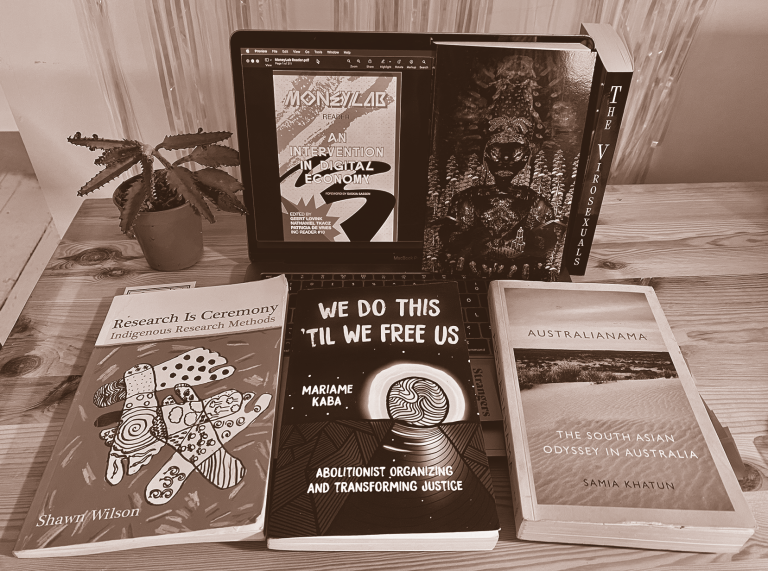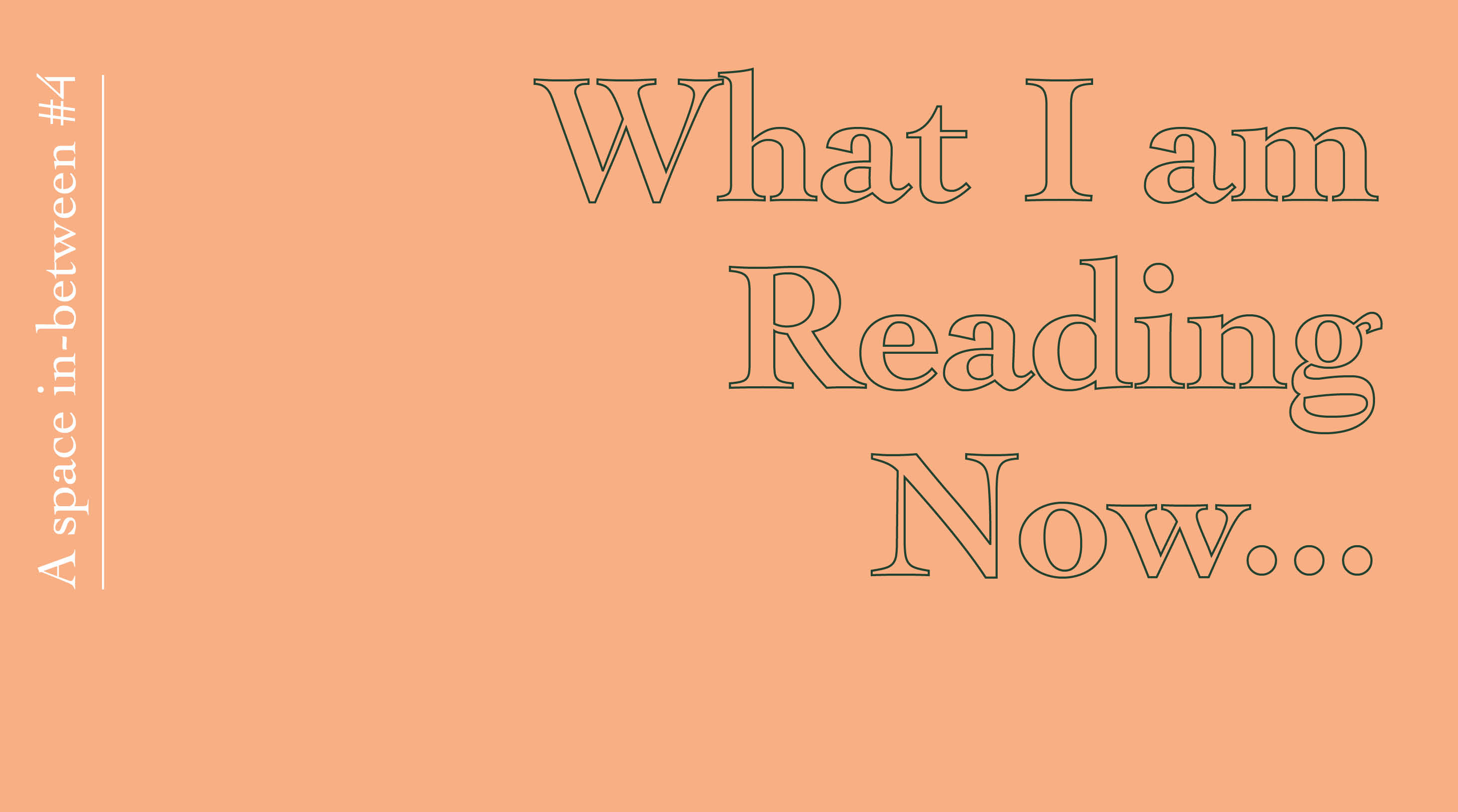What I am Reading Now…
Rehana Zaman
September 2021
Making paths in the long grass.
In the talk ‘Colonial Time and Islam’ Samia Khatun*, described an encounter with an image, seeing the Kasasol Ambia (Story of the Prophets) misidentified as the Quran, in a mosque, in the Australian outback. This reflection forms the basis of Australianama, a book that offered moments of respite and escape during the dark months of January 2021. Samia’s writing weaves multiple diasporic routes from South Asia, across centuries, lands and oceans, centring epistemologies of prophecy, myth and dream to rupture European knowledge traditions. The book resonated deeply, extending many thoughts and questions that had arisen through the making of Your Ecstatic Self (2019) as I attempted to fold spatial temporal geographies through the practices of Sufism, Tantra and Shamanism within and beyond Pakistan and the UK.
I have fond memories of filming scenes from the film with writer and curator Priya Jay in an allotment I look after with friends. Last summer Priya shared The moon waned in Capricorn as the Medicine Woman was sleeping. It’s a beautifully affecting piece, reaching and grasping through love and grief and it’s from the generous citational practice of Priya’s writing I found Shawn Wilson’s Research is Ceremony: Indigenous Research Methods. An Opaskwayak Cree from northern Manitoba, Shawn sets out a research paradigm drawn from Indigenous ways of knowing, being and doing. The book centres relationality as a process of existing and moving through the world, critically, relationality with accountability. It’s method orientated yet personal and asks how knowledge is produced and valued (what is attended to, what is denigrated, what is ignored), within group processes and social contexts.
In January 2018, I began to meet with a group of Black and POC women directly impacted by the carceral system, at a women’s centre in Holloway. I came across Mariame Kaba’s blog @prisonculture and twitter feed around the same name. It felt like the culmination of many threads – the anti-terror surveillance legislation Prevent affecting me, members of my family and the wider Muslim community, spending time with young British Somali and British Pakistani women discussing their experience of racialised spatial politics within Liverpool, meeting filmmakers involved in anti-racist organising in the aftermath of the city’s uprising, deflecting the violent disciplinary measures enacted by the UK Home Office against migrant communities through immigration laws and detention centres whilst running ESOL classes for Voice of Domestic Workers. In We Do this ‘Til We Free Us, Mariame Kaba presents a collection of essays and interviews elaborating abolitionist organising and principles of transformative justice. The book is stunning in its clarity, ferocity and vision. The principles of transformative justice and abolition, working to transform harm, to care and attend to relationships intimate and social, moves beyond abstraction in this series of conversations and texts anchored by Mariame’s many years of experience as a grassroots community organiser. Over time working with others obscures how art and political activity are conceived, the artwork might fall away or crystalise a moment of connection to speak beyond the bounds of the group. Why and how you come together, what takes priority and what counts as ‘the work’, ebbs and flows. In Holloway our conversations began with sharing experiences and watching films together, which generated more conversations, another set of actions. Collectively visioning what an alternative to the criminal punishment system might look like, whether that might be a multifaceted women’s centre or simply a space ‘to lay your head’**. This book arrived after our meetings had paused because of the pandemic but makes me think a lot about what kind of collaborative work was managed before and what is possible now, an invaluable resource for helping bring to reality ‘structures of freedom, resistance and resilience’.
Last summer I joined a Marxism for Artists reading group led by writer and academic Jennifer Doyle, approaching Marxism through a BIPOC Queer Feminist lens. It was an incredibly rich set of conversations generated through texts ranging from the Black Coop movement in 1930s America to kinship structures in Radical Anthropology. The reading list was massive and honestly I’m not even halfway through it. Recently Jennifer did a two-session redux of the course focusing on Money and Cryptocurrency. From these conversations I’ve been working through the MoneyLab Reader, a collection of texts on digital economies, finance capitalism and data. In 2007 I was a producer on an artist film about the impending financial crash of 2008 , meeting with debt activists, hedge fund managers and economists. The terrain has obviously shifted since then but all paths lead back to money – the entanglement of colonial histories and the ongoing projects of dispossession under primitive accumulation. As members of my family have become increasingly immersed in crypto currency investment I’ve engaged more closely in the discourse surrounding it, particularly the ‘liberatory’ claims around deregulation, exchange and participation, and how this intersects with notions of property.
I tend to fly through novels when I’m in production mode. The rhythm of reading fiction helps spark connections. My (final) current read is The Virosexuals by Orion J Facey, published by Psss.co, a dizzying science fantasy set in the near future following Amygdala and her Virosexual companions as they navigate a deadly virus rampaging through the underground kink and BDSM scene. I’ve been around this publication over the past year, catching excerpts, reading interviews with Orion and helping despatch the books. I’m really happy to see it land on UK shores with an incredible cover artwork by Danielle Braithwaite Shirley. It’s an intense, visceral and brilliantly weird read which you can get a taste of in this radio play from earlier this year.
* I came across the talk from an Instagram repost of University of Exeter’s Institute of Arab and Islamic Studies talks programme by Hassan Vawda, friend and luminary on all things art and faith related.
** Quote from Becky, a member of the group.
*** from Everything worthwhile is done with others, an interview with Eve Ewing.
**** Crisis in the Credit System by Melanie Gilligan.
Rehana Zaman is an artist from Heckmondwike based in London. Her work speaks to the entanglement of personal experience and social life, where moments of intimacy are framed against cultural orthodoxies and state coercion. Conversation and cooperative methods sit at the heart of her practice.
She has exhibited widely in the UK and Internationally. Presentations in 2021 include British Art Show 9 (Touring), Trinity Square Video, Toronto, Borås International Sculpture Biennial (Sweden), Artist Film International Whitechapel, London, and Serpentine Projects, London, (forthcoming 2022). In 2019 she co-edited Tongues with Taylor Le Melle, published by PSS and was shortlisted for the Film London Jarman Award. She is currently a board member of not/nowhere artist workers cooperative and LUX who also distribute her films.
Reading
Australianama, Samia Khatun (C Hurst & Co Publishers Ltd, 2018)
Research is Ceremony: Indigenous Research Methods, Shawn Wilson (Fernwood Publishing Co Ltd, 2008)
We Do this ‘Til We Free Us, Mariame Kaba (Haymarket Books, 2021)
MoneyLab Reader: An Intervention in Digital Economy, Geert Lovink, Nathaniel Tkacz, and Patricia de Vries (Eds.) (Institute of Network Cultures, 2015)
The Virosexuals, Orion J Facey (PSS, 2021)

Please note the views published in What I am Reading Now… are personal reflections of the contributors.
These may not necessarily represent the views of the University of Dundee.
———
Previous Issue: Jesal Kapadia, August 2021
Next Issue: Serubiri Moses, October 2021
